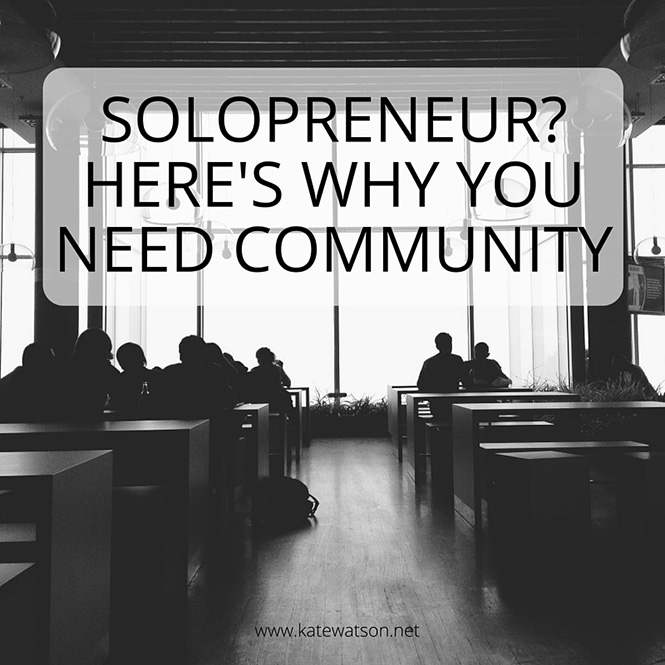
Recently, I realized that I’ve been self-employed for a decade. If that sounds like a long time, I can assure you it is.
Don’t get me wrong. It’s pretty awesome to do work you love and set your own schedule, but it can also be a lonely road. That’s why building your community is essential.
When I was a 9-to-5er, I had an office, co-workers to kibitz with at the water cooler, colleagues and supervisors to strategize with, and a chain of command to turn to if something went wrong. Oh, and let’s not forget that steady paycheck.
As a decade-long “woman of the world” (as Michelle Ward calls we entrepreneurs), now my office is anywhere I happen to be; if I need a chat, I make an appointment with a friend; my poor husband has developed a bad case of sounding-board burnout; and the good ol’ buck stops right here with me, whatever the issue at hand.
All of this has been feeling like a lot of pressure lately, which reminded me of the importance of community.
Community isn’t a one-size-fits-all proposition. Your inner circle can fulfill a lot of roles but not all at the same time (as I discovered when I tried to make my husband my strategy partner, for example). So let’s look at some of the roles your community can fill and who best fits each role:
Need a break?
Hey, we all need a tea or lunch break (preferably at least once a day). When you’re looking for company, anyone with a flexible schedule could work. Students, stay-at-home parents, retirees, all are great places to turn when your 9-to-5er friends and family are busy.
You could also hop on a Skype call with a colleague in another city, if you want some business talk combined with camaraderie.
Having trouble staying on track?
What you want here is an accountability partner. Again, this could be practically anyone.
An accountability partner is exactly what it sounds like: Someone who (kindly!) holds you accountable to your stated goals.
How it works: You let them know what you want to accomplish and then either they check in with you or you update them at a regular interval.
Whether this relationship takes the form of a phone call or email to say, “Hey, I wrote today,” an accountability partner is a great way to stay on track—and connected to the rest of the world.
The key to finding the right fit is to make clear what you need. After all, having a partner who chastises you can be a real buzzkill if you really want a cheerleader, and vice versa.
Need a collaborator?
Having business peers is essential for so many reasons, and collaboration is a big one.
I’ve met most of my co-conspirators through online courses and forums. Other ways are by introducing yourself at conferences or via e-mail, asking for an introduction from a mutual friend, and commenting on other folks’ blogs and social media posts.
Asking someone to collaborate on a small project like a blog crawl, e-book, or free community challenge is a good way to learn how they work and whether you can trust them for a more involved project or partnership later.
Wondering how to price or launch your next offering?
Here’s where solepreneurship gets a bit trickier. When you strategize with people who don’t know much about business (or your business in particular), you don’t know what you’re going to get. As we all know, everyone has an opinion—and it might be as odoriferous as your armpit.
Among the best people to strategize with are your trusted peer network. You are looking for two things in a member of your trusted network:
- Respect for each other’s opinion, and
- Commitment to each other’s success.
If you respect a peer’s opinion but he sees you as a competitor, you’re not going to get his best ideas. And if your peer is a terrific champion but has questionable business instincts or ethics, you’re not going to trust her advice.
Developing a trusted peer network takes time and refinement just like any other important relationship in your life.
Need a stronger community right now?
There are a couple of possibilities if you want to fast track the development of your trusted peer network.
The first option is to join a mastermind group. Of course, many mastermind groups self-organize, but some business coaches and consultants create mastermind groups to help their clients meet like-minded entrepreneurs.
Another way to get experienced business support is to hire it by working with a coach or consultant. What’s the difference?
A consultant typically has a specific methodology for working with clients and offers targeted advice. Also, he or she usually doesn’t stick around to help you implement said advice.
Less experienced consultants also tend to advise people based on what worked in their own businesses whereas experienced consultants are able to provide a variety of suggestions better tailored to your unique situation.
A coach may share her personal and professional expertise, but what she really does is help you tap into your own wisdom to make the right choices for your business. Another perk of a coach: She’ll stand by your side while you experiment with various strategies, holding you accountable and helping you further refine your plan without becoming attached to the direction you take.
Having been a consultant and now in training as a coach, I have a unique perspective on each role’s strengths and weaknesses, and their overall value to small businesses. Check out my About page for more information.
As you can see, while the moniker ‘solopreneur’ suggests you work alone, you really can’t do it without your community—however you choose to build it. After all, friends make everything more fun!
Cheers,
P.S. If you’d like to try out coaching and see if it’s a good fit for you, book yourself a free consultation via my online schedule. It’s simple, fast, and there’s absolutely no obligation!
















